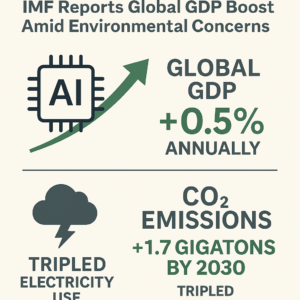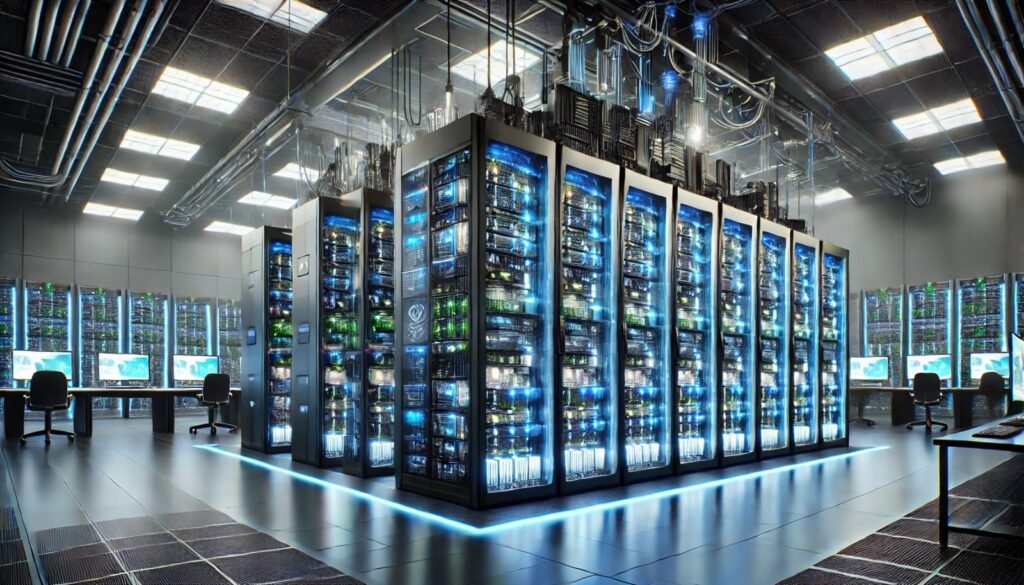Artificial Intelligence (AI) is rapidly transforming industries, economies, and the way we live. In its latest April 2025 report, the International Monetary Fund (IMF) presents a compelling analysis of the AI economic impact, forecasting a global GDP increase of approximately 0.5% annually through 2030. This surge in productivity and innovation positions AI as one of the most influential forces shaping the future of work, business, and national growth. However, these advancements also come with environmental concerns that demand immediate attention.

Understanding the AI Economic Impact on Global Growth
The IMF’s analysis draws a promising picture of how AI could reshape global productivity. By streamlining business operations, optimizing logistics, enhancing healthcare diagnostics, and powering intelligent automation, AI is expected to improve efficiency across sectors. This isn’t just speculation—many countries are already seeing early signs of AI contributing to their economic performance.
For developing economies, AI adoption can bridge infrastructure gaps and leapfrog traditional development barriers. In developed nations, it enhances innovation and cuts costs, giving businesses a competitive edge. The IMF’s projection of a 0.5% GDP increase per year globally underlines AI’s transformative potential.
Environmental Costs of Progress
However, this progress doesn’t come free. The report issues a critical warning: the energy required to power massive AI systems is growing at an alarming rate. By 2030, AI-related electricity consumption is expected to more than triple, reaching over 1,500 terawatt-hours per year—almost the same as India’s current annual electricity use.
Such energy usage could lead to approximately 1.7 gigatons of additional CO₂ emissions between 2025 and 2030 if left unchecked. This would translate into $50 to $66 billion in social costs, according to the IMF’s estimates. These figures highlight a serious concern: while AI brings productivity gains, it also risks straining our planet’s already fragile climate balance.
Balancing Innovation and Responsibility
The IMF emphasizes that policymakers, tech companies, and civil society must act now to ensure responsible and sustainable AI development. Encouraging investment in energy-efficient hardware, regulating emissions from data centers, and incentivizing the use of renewable energy sources are some of the proposed steps.
Moreover, the report notes that AI itself could play a role in reducing carbon footprints. AI-powered systems can optimize energy usage in buildings, improve traffic flow in smart cities, and accelerate research in clean energy solutions. With the right policy frameworks, AI could both create economic value and support sustainability goals.
Equity and Access in the AI Age
Beyond environmental concerns, the IMF also raises issues around access and equity. If AI adoption is concentrated only in a few wealthy nations or corporations, it could widen the global digital divide, leaving low-income countries and small businesses behind. Ensuring inclusive access to AI technologies, training, and infrastructure is critical for shared global prosperity.
There is also a call to upskill workers whose jobs may be displaced by automation. Investing in education and retraining programs is essential to preparing a workforce that can thrive in an AI-driven economy. Without such preparation, the benefits of AI could be unequally distributed, exacerbating existing inequalities.
A Turning Point for Global AI Policy
The IMF report is a wake-up call. It shows us both the unprecedented economic promise of AI and the urgent environmental and ethical risks that come with it. We stand at a crossroads where choices made today will define the trajectory of AI for decades to come.
By embracing innovation and responsibility hand-in-hand, governments and industries can unlock AI’s full potential while protecting the environment and ensuring no one is left behind. The future of AI isn’t just about smarter machines—it’s about smarter decisions.
As we stand on the brink of an AI-powered future, the choices we make now will shape the world for generations. The IMF’s latest report is not just a forecast—it’s a call to action. Yes, AI has the potential to drive remarkable economic growth and innovation, but without responsible oversight, it risks becoming a burden on our planet and society. Governments, industries, and communities must collaborate to ensure AI development is inclusive, energy-efficient, and ethically grounded. The goal isn’t just technological advancement—it’s creating a future where progress uplifts everyone and protects the environment we all share.



